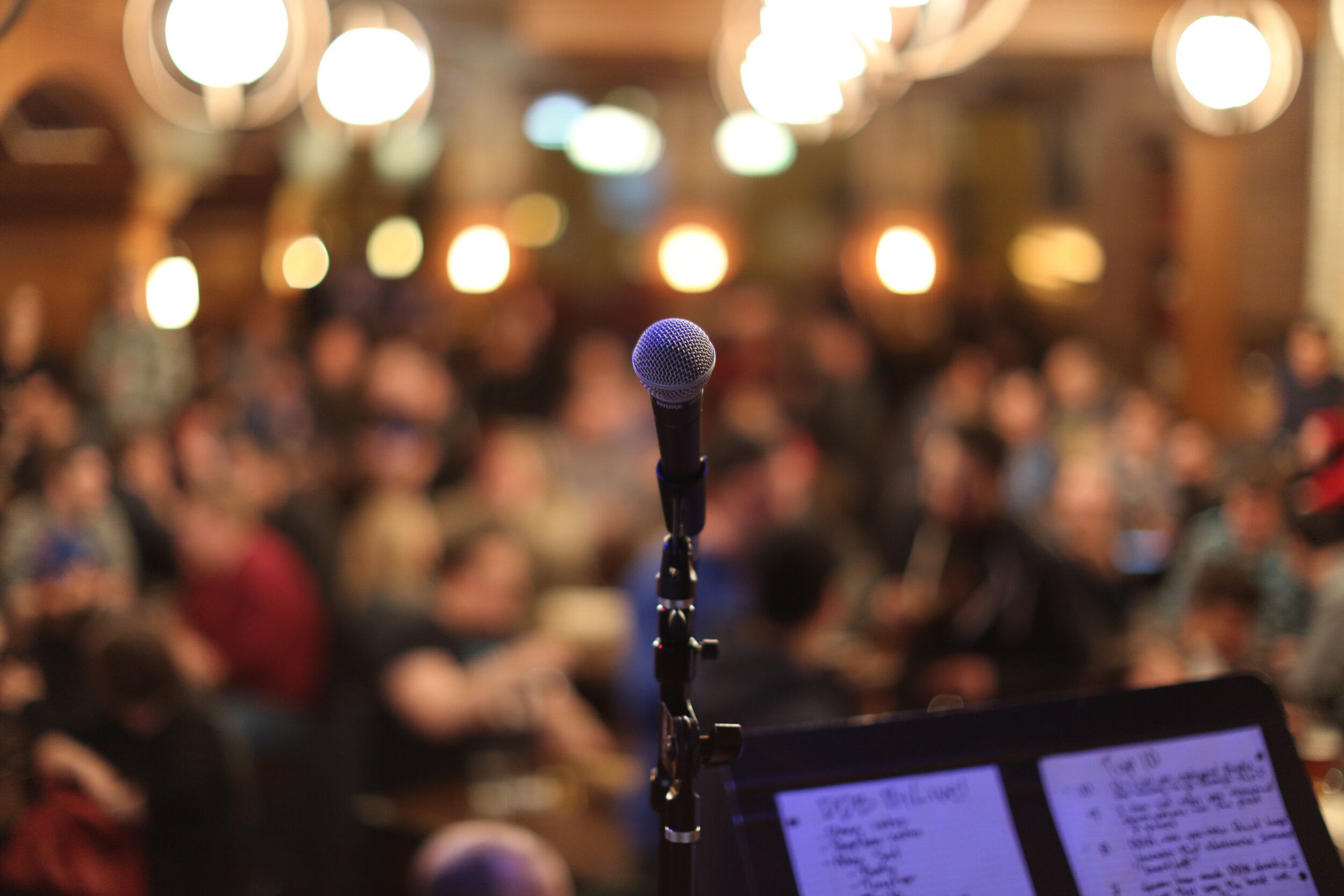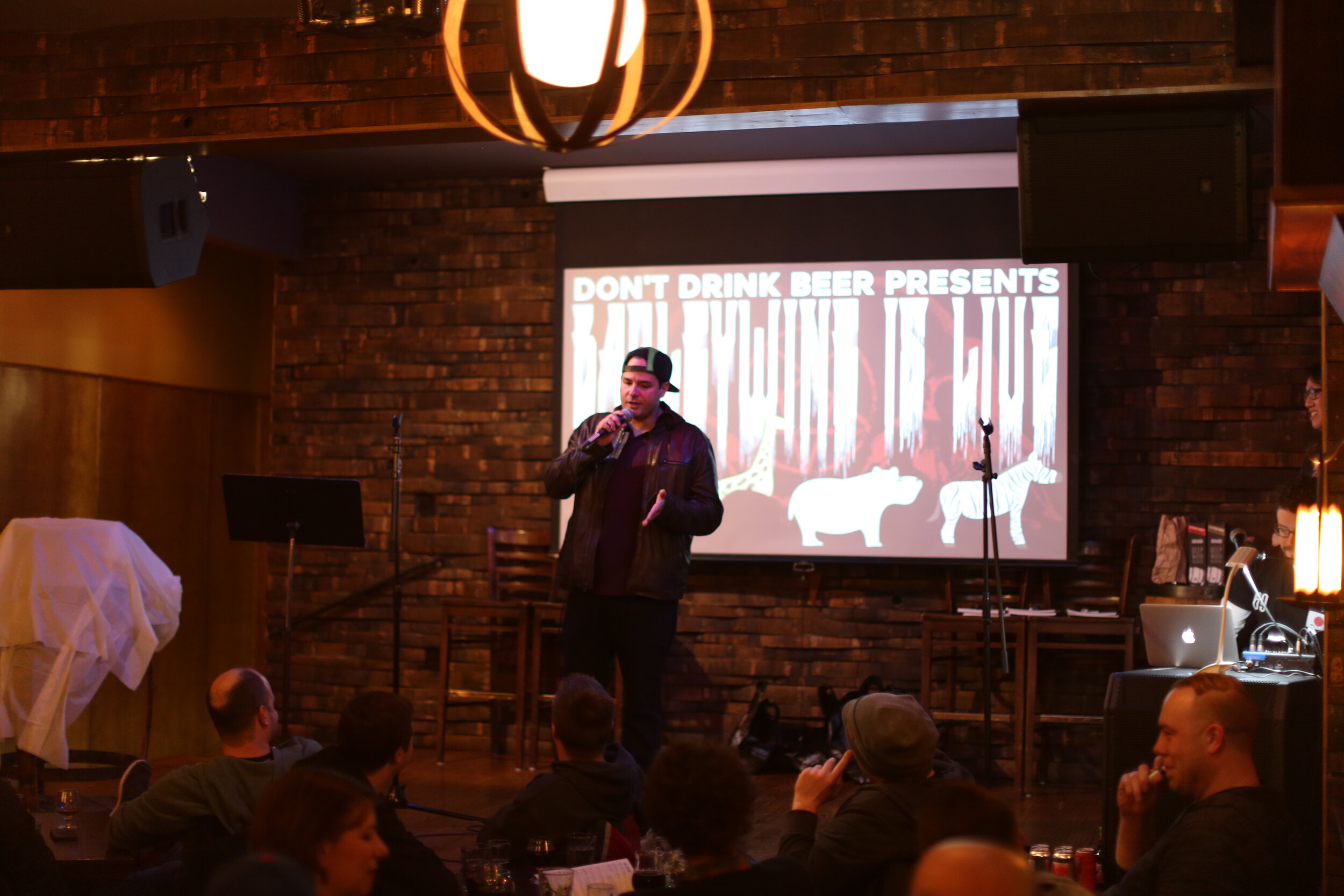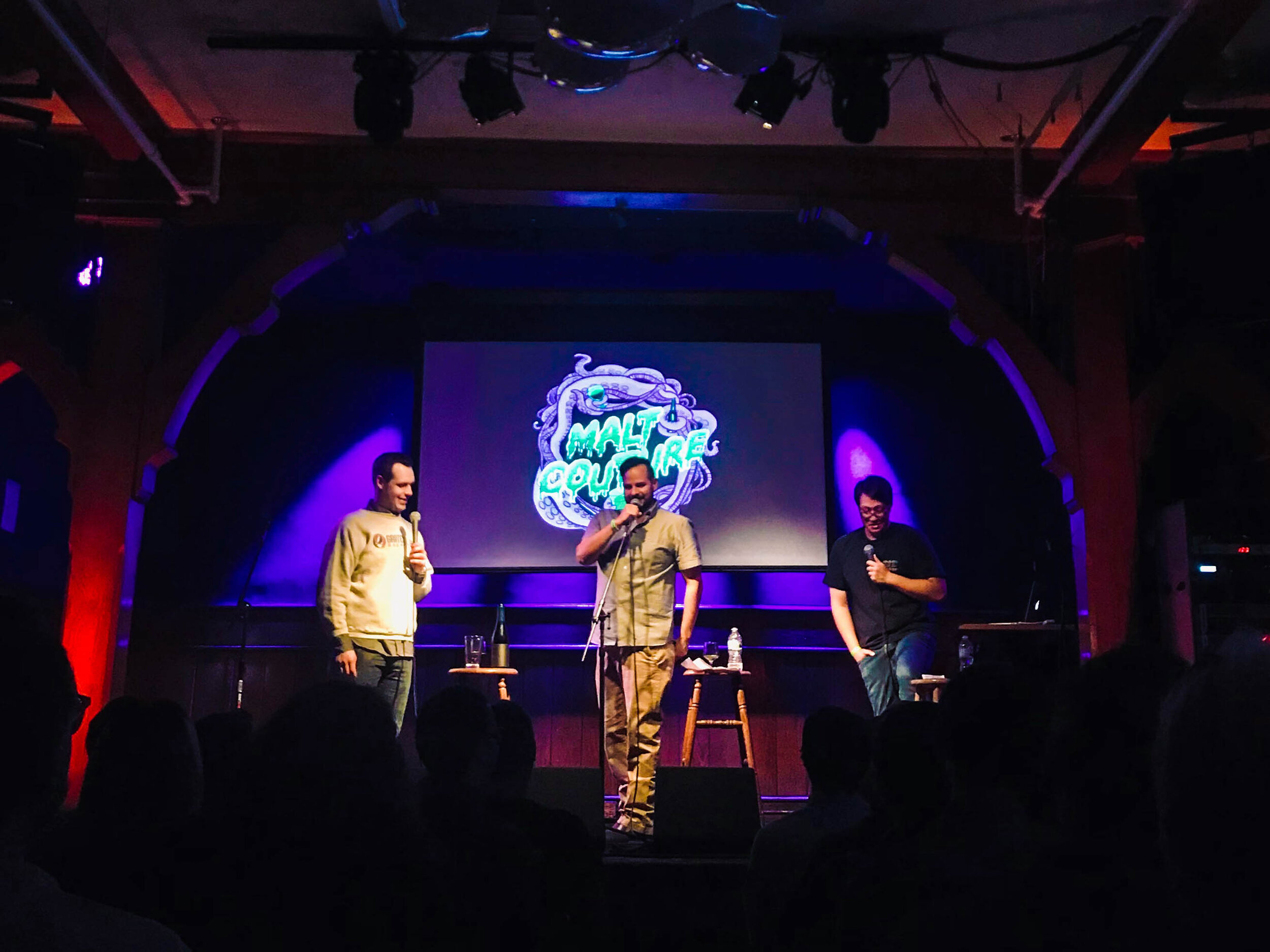Why Don't Drink Beer Is a Monopoly
Early last decade, a surge in beer publications, blogs, and social media accounts surfaced, each looking to ride the craft beer wave. Successful content fell into two core categories. Whether we’re talking about an article, podcast, video, or a post, the material needed to be either 1) informative or 2) entertaining, with the most successful examples straddling the line between both. Many platforms have since fizzled out and there’s a host of reasons to blame. Some lacked the ambition or foresight to keep up with the industry as it grew and evolved at a rapid pace. Others lacked the patience, creativity, or perspective that it takes to achieve any sort of scale in what became a hyperlocal industry. While the barriers to entry are technically low when it comes to beer content creation, the barriers to success are very high. One content creator has managed to navigate the minefields of the last decade so well that he’s set a virtually unreachable bar.
Monopolies are commonly thought to be the result of government regulation, leading to scarcity and high prices. While that can certainly be the case, the term more broadly represents a lack of competition to produce a good or service, coupled with a lack of adequate substitutes. By definition, monopolies aren’t limited to businesses or enterprises, and can even include a specific person if they’re the only source of a given commodity.
It’s never been cheaper and easier to start a professional looking website. Opening a new social media account takes a few minutes and smart phones have all the firepower needed for sharp photos and videos. Recording decent audio and launching a podcast can be figured out in a day. So with craft beer continuing to grow every year for the last decade, how has one individual achieved a market concentration so dominant, with content that’s as entertaining as it is informative, while delivering it at a consistent, regular frequency across every major medium?
Motivation
Before I begin, let me get a key question out of the way. Why should anyone want to make beer content, or any content for that matter? I’ll start with the old phrase that if you love what you do, you’ll never work a day in your life. The truth is that few actually love what they do and most don’t know how to climb their way out of it. They might be talented and successful in their career, but that doesn’t necessarily leave them satisfied. Social media has gifted us with a digital canvas that can act as a modern alternative and wider reaching form of networking than an outdated Microsoft Word resume. Posting online provides a unique opportunity to demonstrate knowledge, talent, commitment, passion, and creativity, and have it be discoverable.
Content creators often have an entrepreneurial spirit in them, but might not have that million dollar idea yet. It could also be confidence, risk tolerance, or a lack of capital to get started. Their gas tank is full of drive and enthusiasm though, with nights and weekends wide open to discover or fine tune their hustle. The best part about creating content, unlike starting up a business, is that you don’t need an end game or an exit strategy when you start out.
The best plan is often having no plan at all other than to do what you love, put it on display, and find your audience over time. If done in a thoughtful manner, the worst case scenario is often discovering like-minded people with the same passion and a heightened feeling of connectedness. Doesn’t sound so bad, does it? The best case is when that passion turns into a career, but not all content creators are prepared for the ups and downs. The journey itself HAS to be something you look forward to each and every day.
The Slow Grind
I remember posing the question to a very smart friend back in 2005, “how does Facebook make any money?” He explained how Facebook’s goal at the time was not to make money, but instead to build a massive user base. It would be years before they ever tried to monetize the platform. Once Facebook reached a critical mass and users became dependent on the service, then and only then would the revenue streams open. By that point, any blowback from ads would be empty threats due to the value being provided in exchange.
Content creators must possess a similar mindset and not expect to quit their day job in those first couple years. When starting out, they’re putting out content that hardly anybody is seeing and must be okay with that, while also staying hungry and motivated. This is where creators should be experimenting, finding their voice, and figuring out what works and what doesn’t. Former NBA guard Jalen Rose phrases this practice needed to hone his craft as “the power of getting reps in,” in reference to the repetitions he needs to advance in his second career in media and podcasting. One of the biggest mistakes that new creators make is that they compare their starting point, to someone else’s prime.
First Mover Advantage
In 2010, there was less than 1,800 breweries operating in the US and over 1,000 of them were small, restaurant-style brewpubs. The amount of regional and national breweries putting beer on store shelves at major retailers barely surpassed 100. Tracking the industry at this time didn’t feel as insurmountable as it does today. Now with an overwhelming 8,000+ breweries in operation and each city at different points of maturation, it’s difficult for an up-and-comer to break through to a wide, national audience. With local being top of mind, a lot of traditional content doesn’t scale or drive traffic like it used to.
By starting down the craft beer journey before or during the latest craft beer boom, certain types of creators are at a distinct advantage having been able to experience the growth more gradually. Craft beer badly needs fresh sets of eyes coming from other industries who break the mold and don’t have the traditional methods of story-telling so ingrained. That being said, stepping into craft beer now brings forth an uphill climb in achieving perspective within today’s crowded landscape.
Finger on the Pulse
To connect with beer’s most invested consumers, keeping a pulse on the conversations, themes, and debates floating across different circles of the internet is necessary to ensure content remains topical and relatable. Ten years ago, the daily kerfuffle was mostly concentrated on BeerAdvocate.com and RateBeer.com forums. While most enthusiasts were loyal to only one of the two sites, keeping up with the dialogues of both was achievable.
Craft Beer’s subsequent growth ran parallel to the peak of Facebook’s power, the rise of Instagram, and an overall behavior shift toward cell phones. Forum driven websites would begin to struggle as the convenience of Facebook Groups integrated beer conversations into the already #1 social platform, complete with mobile accessibility, and without as many usernames and avatars to hide behind. While Facebook couldn’t get specific enough for beer ratings, Untappd swooped onto cell phones and filled that void.
Between staying plugged in to the local scene and having beer ratings at your finger tips, Facebook (including Instagram) and Untappd had you covered. For those covering the beer industry in some form, the conversations became divided across hundreds and now probably thousands of different public and private Facebook Groups. The task of keeping tabs on enough groups to have a true finger on the pulse is daunting and something that few have the ability to do efficiently. Taking the time to aggregate the most buzz-worthy conversations, and weave them into your content is among the ways to not only stay relevant, but distance yourself from the pack.
The Free Beer Conundrum
It’s exciting to be offered free beer when you’re spending a lot of your own money to build revenue-less content. It’s often a sign that you’re being recognized as someone with a respectable following, or [gulp] influence. While breweries might say things like “we want your feedback”, most just want the impressions. If you end up not enjoying the beer, your options include 1) Not posting anything, 2) Posting a negative review. In either case, there’s a good chance you’ll get dropped from that brewery’s mailing list. When beer reviewers who focus on their local scene are all of a sudden singing the praises of a BA Top 10 brewery’s new core offering, it stands out like a sore thumb. Not caring about free beer is one of the best thing you can do for your audience.
Don’t Drink Beer (DDB) set himself apart early by telling the truth about the disappointments that he encountered as a beer enthusiast and trader. By channeling his creative writing and passion for comedy, DDB would provide lengthy reviews on his blog and shorter form versions on social that would be as constructive to brewers as they are entertaining to his readers.
Whether content is informative or entertaining, threading the needle to appeal equally to beer fans and those who work in the industry is nearly impossible. Each side faces their own frustrations and challenges on a daily basis, which rarely coincide. So to establish a rhetoric thats relatable to both, one has to invest a lot of time LISTENING in order to become empathetic to the struggles of brewers and consumers alike.
Beyond Beer
Speaking to the beer is great, especially when an educational moment can also be communicated in an entertaining format, but most enthusiasts have interests and hobbies beyond beer. The ability to intertwine an appreciation for other mainstream topics will cast a wider net and build deeper connections. Some common examples include pop culture, music, sports, food, video games, fitness, and travel, each of which overlap with craft beer’s experience-driven nature in their own unique way.
As an example, Don’t Drink Beer will use Instagram posts and stories to pair his beer with music. IG Stories will have the song and lyrics playing via the integrated Spotify feature. IG posts may include the vinyl record in the background, with adapted lyrics about the beer or brewery in the copy. This may seem minor, but it’s one small element of a diverse total package.
A second example is video games, which DDB creatively weaves into his comedic memes that he posts daily. He will take a screenshot, often from a Role Playing Game (RPG), which features dialogue on the screen, and parallel the scenario to craft beer’s underbelly. The beauty is that you don’t need to have played or recognize the video game to appreciate the joke, it’s again just another element of a deeper character.
The Give and Take
You may not think about this in the moment, but each time you post on social media, you’re either giving or taking. To varying degrees, the post is subconsciously either for your benefit or someone else’s. If I post a picture of my kid reaching a milestone, I’m cashing in some figurative equity that I’ve built up with friends, and they’re making me feel good by engaging. There’s absolutely nothing wrong with this exchange, but let’s face it, that post was for me and my own pride. Conversely if I post a discovery, something entertaining, or share knowledge, I’m more on the giving end.
In the personal social media realm, none of this really matters. But for those extending beyond their family and friends in hopes of building a platform, the give versus take has to be top of mind. I don’t have a percentage or ratio to police yourself with, but success tends to find those where giving content has become second nature and taking ego boosts is of little interest. By focusing on the give, when you do need the help and support of the community you’ve built over time, they’ll be there for you.
Turning Pro
After four years of patience and burning through cash, Facebook eventually introduced ads in late 2007. After nearly twice that amount of time and a lot of disposable income “invested” in beer, Don’t Drink Beer made his identity public. Alex Kidd, a Cal Berkley-educated lawyer who moonlights in stand-up comedy while living in Los Angeles, was the source these comedic beer reviews and over 6,000 Facebook & Instagram posts since 2011.
DDB would begin taking the stage at breweries around the country. Unlike most comedians fighting to put butts in seats, DDB had already built a loyal fanbase. His shows were selling out to full rooms at ticket prices surpassing $40, which is a well-deserved tribute to years of giving a lot more than he was taking.
Alex was joined on stage by friend and fellow comedian Stephen Loh, which quickly lead to launching a podcast later in 2018. In an effort to attract a diverse audience, Malt Couture was created to cover the entire spectrum of approaching beer. Rather than going ultra high brow when rounding out the cast, Stephen instead provides the perspective of the casual craft beer fan who cares a lot more about pro-wrestling than the latest pastry stout. A third comedian and actor named Michael Gabriel serves as the novice who would be just as happy drinking a Modelo Chelada.
Had DDB paired himself with a fellow expert, their potential audience would have stayed limited to a very specific, beer-first crowd. By having the foresight to aim wide, the show offers enough to keep experts engaged, but is encouraging to emerging beer fans while attracting new ones at the same time. What’s impressed me just as much as their ability to balance information and entertainment is their commitment to the audience. On their 2 year anniversary last week, Malt Couture released Batch (Episode) 104, as in 52 weeks in a year x 2 = 104. They’ve yet to miss a week in releasing Thursday episodes, which is a symbol of the loyalty they’ve developed.
The Payoff
In addition to paid shows, which are on pause during the pandemic, Malt Couture has a Patreon where a subscriber base of 545 has committed over $30,000 annually in monthly donations. Donors receive exclusive content and interviews with brewers that the trio develops and shares regularly. The funds go toward expenses and investing back into the quality of the show, but hopefully to support the creators eventually as well. That may not seem like much money split 3 ways, but you don’t get to $40,000 without first reaching $30,000, and to $20,000 without first hitting $10,000. At only the two year mark, I find this fan support impressive, yet not surprising, with a ton of runway left.
With the cultural capital created by Don’t Drink Beer and the frequency of special releases happening in the industry, he’s become an attractive partner for collaborations. After starting a Facebook Group called Barleywine is Life in 2017, originally as a riff, the style [and group] has evolved into a phenomenon in the specialty barrel-aged category with breweries of all types wanting to join the conversation. Just last month, Port Brewing / Lost Abbey whose founder Tomme Arthur received the Brewers Association’s Russell Schehrer Award for Innovation in Craft Brewing in 2018, released a collaboration with Alex called “Don’t Drink Barleywine” in a 19.2oz can. These types of projects with cross promotional elements with respected breweries will continue Don’t Drink Beer and Malt Couture’s upward momentum.
But the best payoff of all after these 10 years of grinding and building loyalty happened just last week. Alex launched a couple raffles on his Instagram page to raise money for the families of Breonna Taylor and Elijah McClain. Both were senselessly murdered by first responders because of the color of their skin and have yet to see any sort of justice. Enthusiasts and brewers who follow Don’t Drink Beer quickly jumped into action and the auctions have snowballed into nearly 80 boxes donated from around the country and over $67,900 raised in less than a week. That’s not just influence, that’s power.
But combining that power with actual leadership is when meaningful progress can start to take place. Being willing to speak the hard truths about his own privilege Saturday night, with all eyes on him, showed a level of self-awareness and humility that’s shared by few.
Last call
The ability to make an entire industry laugh on a daily basis, year after year, takes a special human with an unmatched commitment. Simultaneously keeping fans in the know, improving their beer vernacular, and raising the industry’s collective empathy requires an unusual combination of skills. Hosting a weekly podcast while performing beer-centric stand-up and sketch comedy in front of sold out crowds across the country is the sign of a real unicorn. Then to call upon that audience during the most important movement of our lifetime, demand change, and raise an unthinkable amount of money in just a few days…there’s just no competition.
In your own quest to discover opportunities in this amazing industry, don’t try to be Don’t Drink Beers, because frankly you’ll fail. Instead, summon that weird combination of skills & interests that get you motivated and excited, then become the first you. Make sure that the part you look forward to most is the journey itself and the relationships formed along the way.









